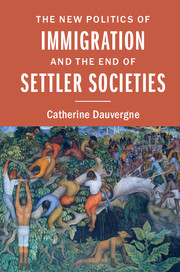Book contents
- Frontmatter
- Contents
- Acknowledgements
- Preface
- 1 Introduction
- 2 Settler societies and the immigration imagination
- PART 1 THE END OF SETTLER SOCIETIES
- PART 2 THE NEW POLITICS
- 6 Why economics and human rights are not enough
- 7 The loss of settlement and society
- 8 The close of the post-colonial
- 9 Contours and consequences of a new politics
- 10 Imagining immigration without a past – stories for the future
- Appendices
- Bibliography
- Index
6 - Why economics and human rights are not enough
from PART 2 - THE NEW POLITICS
Published online by Cambridge University Press: 05 March 2016
- Frontmatter
- Contents
- Acknowledgements
- Preface
- 1 Introduction
- 2 Settler societies and the immigration imagination
- PART 1 THE END OF SETTLER SOCIETIES
- PART 2 THE NEW POLITICS
- 6 Why economics and human rights are not enough
- 7 The loss of settlement and society
- 8 The close of the post-colonial
- 9 Contours and consequences of a new politics
- 10 Imagining immigration without a past – stories for the future
- Appendices
- Bibliography
- Index
Summary
Before turning from the past toward the future, it is crucial to say something about economics and human rights. The new politics of immigration is permeated by economic discourse, but economic factors cannot account for its emergence. Migrant advocates cast many of their arguments in human rights terms, but human rights, like economics, do not account for the shape of the policy terrain that is presently emerging. Economics and human rights predominate in calls for migration law and policy reform. My argument, however, is that both economics and human rights fail to account for contemporary immigration politics. Indeed the fact that these discourses are often twinned in migration policy arguments contributes to policy gridlock. The end of settler society analysis aims to loosen this gridlock. And to that end, before turning to the new politics of immigration, I will highlight how these two factors fit into the picture.
In other words, I want to explain why one of factors hastening the arrival of a new politics is not the global financial crisis that began in 2009 and is still reverberating powerfully. And I need to explain why human rights, which have been a transformational idea in many areas, have made so few inroads into immigration politics.
Turning first to economics. Economic trends are obviously important to immigration policy making and immigration politics. They are also vitally important to the hundreds of thousands of individual decisions about moving or not moving that undergird both “immigration” as a statistical phenomenon and most of our presumptions and theoretical propositions about migration (push factors, pull factors, circular migration, family migration, etc.). Indeed, economic factors are best understood as a constant feature of immigration decision making. As a constant, economics does not explain the current significant change that is taking place in how the world imagines immigration.
There are two important corollaries to this proposition. The first is that economics is a hegemonic discourse in twenty-first century politics of all types. There is an (often enormous) gulf between how sophisticated immigration economists talk about immigration and how politicians talk about immigration. Because of this it is fair to say that immigration policy development is presently dominated by economic discourse, which is not always the same as being dominated by economic analysis. It is commonplace for politicians to assert that particular economic trends can be addressed through adjusting immigration policy.
- Type
- Chapter
- Information
- The New Politics of Immigration and the End of Settler Societies , pp. 117 - 123Publisher: Cambridge University PressPrint publication year: 2016



